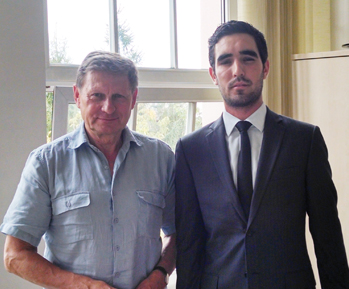Famed Polish Economist Invites UT Student to Think Tank
In November 2013, famed Polish economist Leszek Balcerowicz spoke on the UT Austin campus as part of International Education Week, which celebrates the enriching benefits of international education and exchange.
Those “enriching benefits” were not lost on one audience member, economics senior Hector Cantu from Monterrey, Mexico. After the lecture, Cantu introduced himself to Balcerowicz and spoke of his interest in conducting a research project on harmonization in the global economy. Balcerowicz was interested and, after reviewing a proposal and a faculty recommendation, invited Cantu to spend the summer in Poland as a visiting student researcher.
“He’s a legend in Poland because he was in charge of the transition between having a socialist and capitalist economy. He applied very radical ideas that not many people were in favor of at the time. But now Poland is one of the most economically developed countries in the EU,” says Cantu, who served as a research assistant at the Civil Development Forum Foundation (FOR) think tank, which is chaired by Balcerowicz. Cantu also met with embassy representatives from around the world and worked on his thesis while in Poland.
A member of the influential Washington-based financial advisory body, the Group of Thirty, Balcerowicz is also head of the Department of International Comparative Studies at the Warsaw School of Economics. Previously he served as deputy prime minister of Poland, minister of finance and the governor of the National Bank of Poland.
The College of Liberal Arts awarded Cantu an Undergraduate Research Scholarship to help cover the cost of his project. The scholarship, along with savings from two jobs Cantu held the previous semester, were enough to pay for his trip.
Cantu arrived in Warsaw on June 1 and began work at FOR. The 21-year-old was the first international student to do research at the organization, working alongside seasoned Polish economists in creating policy recommendations promoting economic freedom in developing countries. He lived in the dormitories at the Warsaw School of Economics, which were occupied by Belarusian, Ukrainian and Polish students. Unfamiliar with the Polish language, Cantu relied on English, his second language, to communicate.
“They received me with open arms,” says Cantu, who quickly adapted to his surroundings. “They gave me resources that helped me learn about the EU in a way that is uncommon if you’re outside of the European Union. Poland has a lot of very bright, very intelligent people with important economic ideas.”
Cantu’s main focus during his stay in Warsaw was on harmonization between the United States and the European Union, particularly in tax law. This is the topic that Cantu first pitched to Balcerowicz, and he chose to write a thesis about it during his time in Warsaw. The paper, “Economic Growth with Labor Law, Corporate Tax Law and VAT Law Harmonization Between the United States and the European Union,” is 37 pages of intense research and analysis.
“For every good research paper, you need to have a lot of good background information,” Cantu says. “So for that we used a lot of statistics, a lot of research and a lot of comparison analysis.”
“Collaboration with Hector this summer has been successful, and he was a reliable and hard-working person,” Balcerowicz said in a letter to UT Austin discussing his research. “We hope to stay in touch with Hector and continue our cooperation in the future.”
Cantu is now working with UT Austin economics lecturer Wayne Hickenbottom on revising his thesis and plans to submit it to an economics research journal for publication.
In terms of post-graduation plans, Cantu says his dream is to work for the International Monetary Fund and help shape the global economy. “I want to make changes in a macroeconomic perspective. That’s the most important thing that the Polish left me with,” Cantu says.
“I want to make good relationships between the United States, between Mexico and the European Union. I want to extend the commerce and I want to open the market, cut the barriers. With a little good research, you can make great changes.”

